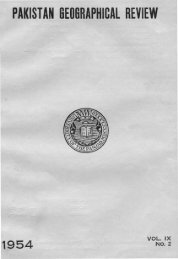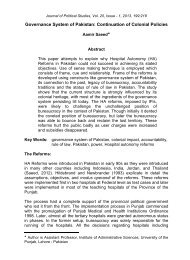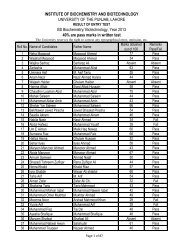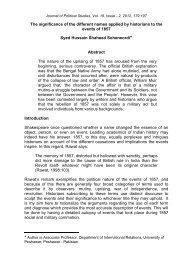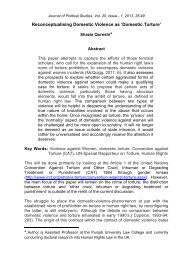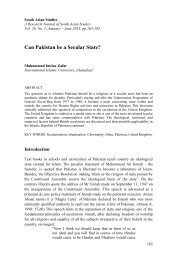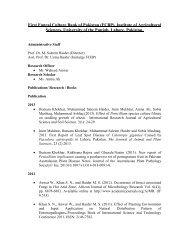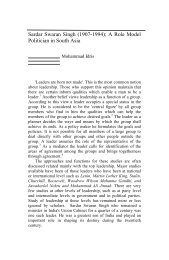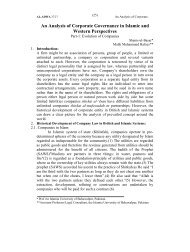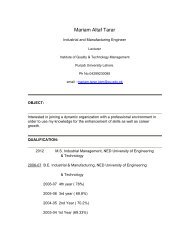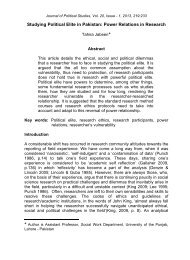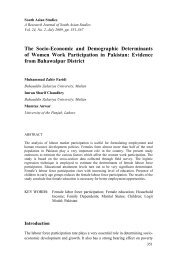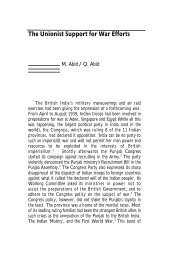Roots of authoritarianism in Pakistan-KU.pdf
Roots of authoritarianism in Pakistan-KU.pdf
Roots of authoritarianism in Pakistan-KU.pdf
You also want an ePaper? Increase the reach of your titles
YUMPU automatically turns print PDFs into web optimized ePapers that Google loves.
Authoritarianism <strong>in</strong> <strong>Pakistan</strong><br />
because the Muslim elite <strong>of</strong> <strong>Pakistan</strong> comprised <strong>of</strong> opportunists<br />
who only jo<strong>in</strong>ed the <strong>Pakistan</strong> Movement after it was apparent<br />
that a new Muslim state was go<strong>in</strong>g to emerge soon.<br />
The founder <strong>of</strong> <strong>Pakistan</strong>, J<strong>in</strong>nah himself has been accused <strong>of</strong><br />
be<strong>in</strong>g authoritarian. “Notwithstand<strong>in</strong>g the differential<br />
adm<strong>in</strong>istrative legacies, both India and <strong>Pakistan</strong> drew heavily on<br />
the colonial state’s methods <strong>of</strong> bureaucratic control and<br />
centralisation [after partition]. The government <strong>of</strong> India act <strong>of</strong><br />
1935, strengthen<strong>in</strong>g the very bureaucratic ‘steel frame’ <strong>of</strong> the<br />
British raj that had been the bête noire <strong>of</strong> Indian nationalists, was<br />
adapted to serve as the constitutional framework <strong>in</strong> both<br />
countries. In pr<strong>in</strong>ciple, the ideal <strong>of</strong> democracy based on the<br />
Westm<strong>in</strong>ster model <strong>of</strong> parliamentary government ensured a<br />
formal separation between the bureaucracy and a representative<br />
political executive. But <strong>in</strong> actual practice the bureaucratic<br />
<strong>authoritarianism</strong> <strong>in</strong>herent <strong>in</strong> the colonial state structure rema<strong>in</strong>ed<br />
largely <strong>in</strong>tact.” 5<br />
Like <strong>in</strong> India, Lord Mountbatten thought he would be asked to<br />
rema<strong>in</strong> the Governor-General <strong>of</strong> <strong>Pakistan</strong> too. But he was <strong>in</strong> for a<br />
surprise. “Mountbatten hoped and <strong>in</strong>deed expected to be asked<br />
to stay on as jo<strong>in</strong>t governor-general over both new dom<strong>in</strong>ions, at<br />
once symbolis<strong>in</strong>g their friendly and cont<strong>in</strong>ued cooperation while<br />
expedit<strong>in</strong>g the process <strong>of</strong> the f<strong>in</strong>al division <strong>of</strong> assets <strong>in</strong> an<br />
equitable manner. J<strong>in</strong>nah would hear noth<strong>in</strong>g <strong>of</strong> that, however,<br />
<strong>in</strong>sist<strong>in</strong>g he must become governor-general <strong>of</strong> <strong>Pakistan</strong><br />
himself…He was eager to enjoy at least a taste <strong>of</strong> power, to<br />
which he had given so much <strong>of</strong> his energy…Be<strong>in</strong>g governorgeneral<br />
would raise him eye-to-eye with Mountbatten, Attlee,<br />
5 Jalal, Ayesha, Democracy and Authoritarianism <strong>in</strong> South Asia: A<br />
Comparative and Historical Perspective, (Cambridge: Cambridge<br />
University Press), p. 18.<br />
3



